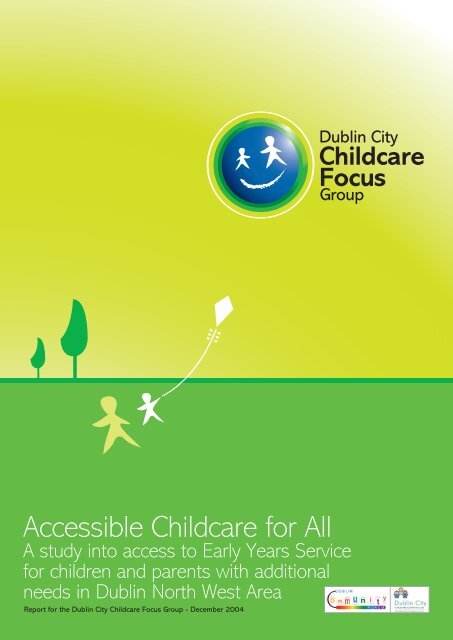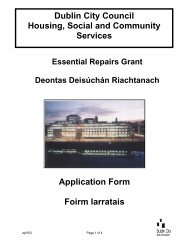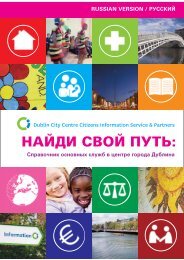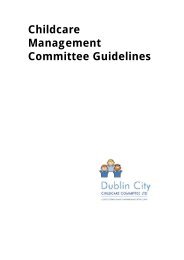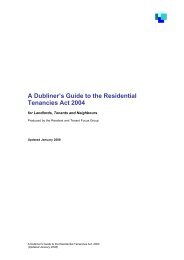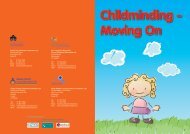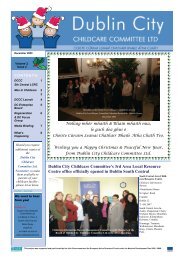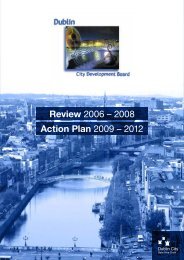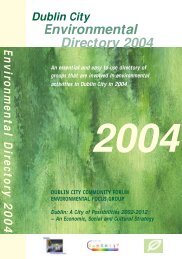Accessible Childcare for All - Dublin.ie
Accessible Childcare for All - Dublin.ie
Accessible Childcare for All - Dublin.ie
You also want an ePaper? Increase the reach of your titles
YUMPU automatically turns print PDFs into web optimized ePapers that Google loves.
“<strong>Accessible</strong> <strong>Childcare</strong> <strong>for</strong> <strong>All</strong>” December 2004Table of contentsAcknowledgments ...................................................................................................1Table of contents .....................................................................................................3Executive summary .................................................................................................5Introduction ..............................................................................................................91. Background to the Research ........................................................................92. Research Aim and Objectives.....................................................................113. Methodology.................................................................................................133.1 Desk Research and Literature Rev<strong>ie</strong>w..................................................................... 133.2 Survey of Early Years Service Providers ................................................................. 133.3 Questionnaire <strong>for</strong> Parents of children with additional needs.................................... 143.4 Questionnaire/Survey of Parents with additional needs........................................... 143.5 Interv<strong>ie</strong>ws with specialised childcare providers and agenc<strong>ie</strong>s ................................. 153.6 Focus group with Public Health Nurses and Speech and Language Therapists..... 164. Findings ........................................................................................................174.1 Introduction............................................................................................................... 174.2 Specific Objectives .................................................................................................. 185. Recommendations .......................................................................................345.1 Data .......................................................................................................................... 345.2 In<strong>for</strong>mation................................................................................................................ 345.3 Increasing Personnel................................................................................................ 345.4 Early Intervention...................................................................................................... 355.5 Support <strong>for</strong> parents around diagnosis ...................................................................... 355.6 Ongoing support <strong>for</strong> parents..................................................................................... 365.7 Financial Support <strong>for</strong> Children with Additional Needs.............................................. 365.8 Funding <strong>for</strong> Early Years Service Providers .............................................................. 365.9 Training <strong>for</strong> Early Years Service Providers. ............................................................. 375.10 Policy Regulations.................................................................................................... 375.11 Support and expand existing links and initiatives..................................................... 375.12 Parents with disabilit<strong>ie</strong>s ............................................................................................ 385.13 Early Start Programme............................................................................................. 385.14 Inclusion Assessment............................................................................................. 38Bibliography ...........................................................................................................39Appendix I: <strong>Childcare</strong> Providers Questionnaire .................................................45Appendix II: Questionnaire <strong>for</strong> Parents of Children with Additional Needs.....49Appendix III: Questionnaire <strong>for</strong> Agenc<strong>ie</strong>s............................................................5112 Middle Mountjoy Street, <strong>Dublin</strong> 7. Tel 087-9286060/085-7249934. email: orcresearch@hotmail.com3
“<strong>Accessible</strong> <strong>Childcare</strong> <strong>for</strong> <strong>All</strong>” December 2004Executive summaryThe mainstreaming of services <strong>for</strong> children with additional needs, so that theyreceive their education in an inclusive environment alongside peers who donot have such needs, is now central to national policy and is most fullyarticulated in The Education <strong>for</strong> Persons With Special Educational Needs Act2004. The primary aim of this research is to identify and promote solutionsdesigned to ensure equality of access and opportunity in terms of childcareprovision <strong>for</strong> children with learning, sensory, physical and emotional additionalneeds. The research also concerns itself with issues pertaining to parents withadditional needs who have children of pre-school age.This is a local study confined to <strong>Dublin</strong> City Council Northwest AdministrativeArea (including Finglas, Ballymun, Whitehall and parts of Santry andGlasnevin), but it is envisaged that the issues and solutions identif<strong>ie</strong>d will berelevant to other <strong>Dublin</strong> City geographical areas and at a national level. Arange of research techniques were employed, including:• Desk research and a literature rev<strong>ie</strong>w• A survey of early years’ service (EYS) providers• A questionnaire <strong>for</strong> parents of children with additional needs• A questionnaire <strong>for</strong> parents with additional needs• Interv<strong>ie</strong>ws with specialised childcare providers and agenc<strong>ie</strong>s• Focus groups with public health nurses and speech and languagetherapists.There is a significant lack of in<strong>for</strong>mation and data on pre-school children withadditional needs. There are difficult<strong>ie</strong>s around making definitive diagnoses atan early age there<strong>for</strong>e these problems cannot be absolutely rectif<strong>ie</strong>d.Nevertheless record keeping, commenced where possible at diagnosis andcentrally collated - perhaps as a subset of the Health Research Board’sdatabases - would be helpful.5
“<strong>Accessible</strong> <strong>Childcare</strong> <strong>for</strong> <strong>All</strong>” December 2004The high response rate to the survey of early years service providers, and thecontent of those responses, point to a general willingness on the part of saidproviders to be as inclusive as possible. However parents’ responses, andthose of some early years service providers suggest that there is a shortfall ofsuitable places <strong>for</strong> children with additional needs, and that this is especiallythe case when children’s additional needs are more pronounced. For thisreport we have compiled a list of Principles and Protocols <strong>for</strong> Inclusion thatcould be adopted by early years’ service providers. These are practical,attainable and not financially prohibitive.Parents of children with additional needs and parents with additional needsreported a general, sometimes profound sense of isolation. There is a need<strong>for</strong> greater support <strong>for</strong> parents during and after their child’s diagnosis, and it isrecommended that counselling be made available <strong>for</strong> these parents whenrequired, and that the Health Boards and Local <strong>Childcare</strong> Resource Centresundertake to direct parents to other organisations that provide counselling <strong>for</strong>specific conditions. Increasing supports <strong>for</strong> parents would ease their isolation.More respite options, particularly during holiday periods, would also bedesirable.Parents with additional needs identif<strong>ie</strong>d access and communication difficult<strong>ie</strong>s,and cost and conven<strong>ie</strong>nce of transport <strong>for</strong> their children as major issues.Many parents of children with additional needs also identif<strong>ie</strong>d financialpressures as a problem. The Cost of Disability Payment proposed by the NDA- defined as the amount it costs a disabled person to ach<strong>ie</strong>ve the samestandard of living as a non-disabled person - should be introduced and couldbe used to ensure that parents with additional needs and parents of childrenwith additional needs in early years service are not at a financialdisadvantage.6
“<strong>Accessible</strong> <strong>Childcare</strong> <strong>for</strong> <strong>All</strong>” December 2004Financial difficult<strong>ie</strong>s are exacerbated by a lack of access to in<strong>for</strong>mation onavailable support. Provision <strong>for</strong> quality childcare <strong>for</strong> all children is importantbut especially children with additional needs that support their ongoingdevelopmental. It is recommended Local <strong>Childcare</strong> Resource Centres couldprovide a useful service <strong>for</strong> parents by compiling a booklet detailing localchildcare provision <strong>for</strong> children with additional needs.There is a shortage of funding and grants targeted at increasing access tochildcare <strong>for</strong> children with additional needs, and also a lack of awarenessamongst early years service providers as to what funding is available. Adesignated ring-fenced budget <strong>for</strong> Special Needs Assistants and othersupports in early years service would be more effective than the currentdiscretionary, ad hoc arrangements. Service wide awareness of theprovisions of the Equal Opportunit<strong>ie</strong>s <strong>Childcare</strong> Programme should increaseproviders’ capacity to be inclusive and the Local <strong>Childcare</strong> Resource Centrescould ensure that this funding in<strong>for</strong>mation is disseminated.Most early years service providers surveyed identif<strong>ie</strong>d a need <strong>for</strong> morefunding <strong>for</strong> special needs training. Certainly if inclusion is to be maximisedthen a Special Needs module should be included in all early years servicetraining courses.The research also pointed to a clear and urgent need <strong>for</strong> more OccupationalTherapists, Clinical Psychologists, Speech and Language Therapists, PublicHealth Nurses and other personnel involved in the diagnosis, treatment andsupport of children with additional needs.This report was commissioned and led by The <strong>Dublin</strong> Community Forum’s<strong>Dublin</strong> City <strong>Childcare</strong> Focus Group; funded by the National Disability Authorityunder the NDA Research Promotion Scheme 2004 and The <strong>Dublin</strong> City<strong>Childcare</strong> Committee; and researched and written by O’Regan CassidyResearch. The researchers would like to express their gratitude <strong>for</strong> thegoodwill and assistance of those we were in contact with. We found that therewas a clear desire throughout the sector to make more inclusive services areality, and we hope that this report can contribute towards ach<strong>ie</strong>ving this.7
“<strong>Accessible</strong> <strong>Childcare</strong> <strong>for</strong> <strong>All</strong>” December 2004The National Disability Authority (NDA) was established in 2000 and its br<strong>ie</strong>fincludes policy advice, research, and monitoring standards of disabilityservices, including services specific to children. It advocates an inclusivesoc<strong>ie</strong>ty based on principles of equality, participation and choice.The <strong>Dublin</strong> City <strong>Childcare</strong> Focus Group is a voluntary group made up ofcommunity and private childcare providers and parents using childcareservices. It was established (in 2001) under the auspices of the <strong>Dublin</strong>Community Forum and has close links with <strong>Dublin</strong> City Council. <strong>Dublin</strong> CityCouncil recently signed up to the principles <strong>for</strong> disabled rights and inclusionoutlined in the Barcelona Declaration.As the <strong>Dublin</strong> City <strong>Childcare</strong> Focus Group works towards providing the bestpossible range of effective childcare in <strong>Dublin</strong>, and acts as a conduit ofin<strong>for</strong>mation between those working in childcare at grassroots level, membersof the <strong>Dublin</strong> City <strong>Childcare</strong> Committee, and the <strong>Dublin</strong> City DevelopmentBoard, it is ideally placed to help the NDA and policy makers to ensure thatchildren with disabilit<strong>ie</strong>s can access and participate in the same educationalopportunit<strong>ie</strong>s, in the same settings as their non-disabled peers, and thatparents’ rights be respected in the process.The <strong>Dublin</strong> City <strong>Childcare</strong> Committee was established in March 2001underthe Depart of Justice Equality and Law Re<strong>for</strong>m, Equal Opportunit<strong>ie</strong>s <strong>Childcare</strong>Programme (EOCP) as part of the National Development Plan (NDP) 2000-2006. The objectives of EOCP are to improve the quality of childcare,increase the number of facilit<strong>ie</strong>s and introduce a co-ordinated approach to thedelivery of childcare services. The <strong>Dublin</strong> City <strong>Childcare</strong> Committee strategy isresponsible at local level <strong>for</strong> improvement of childcare service in the City. Thestrategy was designed in line with the principles established by the UnitedNations Convention on the rights of the child. The <strong>Dublin</strong> City <strong>Childcare</strong>Committee is committed to creating an environment that values all children, byfacilitating the development of an infrastructure of high quality EDU-careservices that support the holistic development of children in the context offamily and community through-out <strong>Dublin</strong> City.8
“<strong>Accessible</strong> <strong>Childcare</strong> <strong>for</strong> <strong>All</strong>” December 2004IntroductionThe primary aim of this research project is to identify and promote solutionsdesigned to ensure equality of access and opportunity in terms of childcareprovision <strong>for</strong> children with learning, sensory, physical and emotional additionalneeds.This report comprises the following sections: background to the research; aimand objectives of the study; the methodology employed; research findingsincluding gaps in service provision; conclusions drawn from those findings,and finally, recommendations to address gaps and improve service provision.1. Background to the ResearchIn 1996 the Commission on the Status of People with Disabilit<strong>ie</strong>s produced aseminal document ‘A strategy <strong>for</strong> Equality’, which placed mainstreaming firmlyat the centre of national policy and obliged service providers to ensure thattheir systems, services and products were accessible to all. One objective inthe strategy was that “children with a disability will be entitled to the servicesthey need to ach<strong>ie</strong>ve their full potential”, and the document further stated that‘every encouragement and practical support, including financial support,should be given to pre-school services who wish to include children withdisabilit<strong>ie</strong>s in their services’. Pre-school provision <strong>for</strong> children with disabilityhas been characterised in the past as uncoordinated and fragmented (CECDE2003) but the will seems to be there to improve this situation, and it is hopedthat this report can assist in this process.The 1998 Education Act introduced specific provision <strong>for</strong> the right of equalaccess to, and participation in education <strong>for</strong> children with additional needs,entitling them to extra assistance, including resource teachers, special needsassistants, improved access to schools and supportive technology. The EqualStatus Act of 2000 prohibited discrimination in the area of services, includingservices <strong>for</strong> children, on grounds of disability.9
“<strong>Accessible</strong> <strong>Childcare</strong> <strong>for</strong> <strong>All</strong>” December 2004In 2004 “The Education For Persons with Special Educational Needs Act” reaffirmsthe aspiration <strong>for</strong> mainstreaming education <strong>for</strong> people with additionalneeds and states that ‘the education of people with such needs shall,wherever possible, take place in an inclusive environment with those who donot have such needs, to provide that people with special educational needsshall have the same right to avail of, and benefit from appropriate educationas do their peers..[and]..to provide <strong>for</strong> the greater involvement of parents ofchildren with special educational needs in the education of their children.”This study was conducted at area committee level within <strong>Dublin</strong> City andconfines itself to the <strong>Dublin</strong> Northwest area (which encompasses the Finglas,Ballymun, Poppintree Whitehall and parts of Santry and Glasnevin).“ <strong>All</strong> children have a right to pre-school education. They are the future and,they are the future of Ballymun. They deserve to reach whatever goal theywish to reach” - Sr Majella – School Principle Our Lady’s NurseryThe situation in <strong>Dublin</strong> North West is not necessarily representative of otherparts of the city, where <strong>for</strong> example different socio-economic factors mightcome into play, and there are further differences to be considered betweenurban and rural areas. Nevertheless, if the findings herein are not whollyindicative of the situation outside of <strong>Dublin</strong> North West, researching theseissues on a local scale will highlight issues and solutions that are pertinent inother geographical areas locally and nationally.10
“<strong>Accessible</strong> <strong>Childcare</strong> <strong>for</strong> <strong>All</strong>” December 20042. Research Aim and ObjectivesAimThe primary aim of this action research project is to identify and promotesolutions designed to ensure equality of access and opportunity in terms ofchildcare provision <strong>for</strong> children with learning, sensory, physical and emotionaladditional needs and <strong>for</strong> children whose parents have a disability. Particularemphasis will be given to addressing the range and quality of provisionintegrating the child with disabilit<strong>ie</strong>s with other children.ObjectivesThe specific objectives of the study are:1. To estimate the number of children with additional needs in attendance inearly years services in the area, while establishing if there is a shortfall inplaces in these services <strong>for</strong> children with additional needs.2. To identify the issues facing parents with disability in seeking and utilisingchildcare provision, having regard to the range of disabilit<strong>ie</strong>s exper<strong>ie</strong>nced.3. To investigate the various funding, grants and training available to parentsand childcare providers <strong>for</strong> additional needs assistance (i.e. in crèches,pre-schools and out of school care).4. To develop a set of ‘Protocols <strong>for</strong> Inclusion’ based on the research andexisting policy that would cover access and facilit<strong>ie</strong>s <strong>for</strong> children withadditional needs. <strong>Childcare</strong> providers could voluntarily adopt theseprotocols.5. To in<strong>for</strong>m parents, childcare providers, statutory agenc<strong>ie</strong>s, and policymakers of the gaps in provision vis-à-vis needs, and of other pertinentissues, and to suggest ways to create better access <strong>for</strong> parents andchildren with disabilit<strong>ie</strong>s.11
“<strong>Accessible</strong> <strong>Childcare</strong> <strong>for</strong> <strong>All</strong>” December 20046. To prepare recommendations to government and childcare providers thatwould, if implemented, address gaps in specific supports, and to enablethe <strong>Dublin</strong> City <strong>Childcare</strong> Focus Group to lobby and advance these issuesthrough the <strong>Dublin</strong> City Development Board, <strong>Dublin</strong> City <strong>Childcare</strong>Committee, Health Boards and other relevant statutory and non-statutoryagenc<strong>ie</strong>s.12
“<strong>Accessible</strong> <strong>Childcare</strong> <strong>for</strong> <strong>All</strong>” December 20043. Methodology<strong>All</strong> early years services were contacted, including preschools, Montessori, fulland part day care, special schools, crèches and playgroups, and both privateand community childcare providers. The study also encompasses the v<strong>ie</strong>wsand exper<strong>ie</strong>nces of parents of preschool children with additional needs,parents who have children currently or recently of preschool age, and a widerange of professionals working in the f<strong>ie</strong>ld. The researchers would like toacknowledge the assistance of all those who contributed.3.1 Desk Research and Literature Rev<strong>ie</strong>wA general rev<strong>ie</strong>w of recent publications and research on childcare <strong>for</strong> childrenwith additional needs was conducted. This included examination of anyrelevant legislation and policy documents, other published and unpublishedresearch, and recent reports by expert bod<strong>ie</strong>s on childcare and disability.3.2 Survey of Early Years Service ProvidersA list of all early years services in the North West area was obtained from theNorthern Area Health Board. O’Regan Cassidy Research developedquestionnaires in consultation with the <strong>Dublin</strong> City <strong>Childcare</strong> Focus Group andthese were sent to 62 facilit<strong>ie</strong>s. (APPENDIX I). The questionnaires weredistributed by post and followed by up to four rounds of phone calls toproviders who were slow in responding. In total there was a 78% responserate. The survey of childcare providers provided a great deal of in<strong>for</strong>mation onaccessibility issues <strong>for</strong> children with additional needs in the area, and onissues relating to the provision of a quality service to children with specialneeds.13
“<strong>Accessible</strong> <strong>Childcare</strong> <strong>for</strong> <strong>All</strong>” December 20043.3 Questionnaire <strong>for</strong> Parents of children with additional needsThe <strong>Dublin</strong> City <strong>Childcare</strong> Focus Group and O’Regan Cassidy SocialResearch also developed a questionnaire <strong>for</strong> parents of children withadditional needs. This included questions pertaining to the children’sindividual needs, the parents’ exper<strong>ie</strong>nces of finding early years services <strong>for</strong>their child, the suitability of their current/previous early years service, andmore general questions aimed at eliciting gaps in services. (APPENDIX II).The parents’ questionnaire was distributed to selected ‘gatekeepers’ <strong>for</strong>further distribution: these included public and private childcare providers,Health Boards (Public Nurses and Speech and language therapists), Clinics(Mater Family guidance Clinic Ballymun, Temple street children’s hospital,CRC) and support organisations such as Aspire, The Wheelchair Association,St. Michaels House, and Down Syndrome Ireland. Parents of children withadditional needs proved very difficult to identify and contact. Of all sources 11surveys were received but these proved useful in identifying pertinent issues.3.4 Questionnaire/Survey of Parents with additional needsParents with a range of additional needs were identif<strong>ie</strong>d, contacted, andasked to highlight issues from their exper<strong>ie</strong>nce of accessing early yearsservices <strong>for</strong> their children. These parents were surveyed through phoneinterv<strong>ie</strong>ws and email questionnaires. As there were difficult<strong>ie</strong>s in findingparents with disabilit<strong>ie</strong>s in a position to contribute to the research in the <strong>Dublin</strong>Northwest area, some of the parents contacted were not from the area, andothers were parents of children now in primary level education. In total therewere five respondents to the survey of parents with a disability. Theseincluded three physically disabled parents, one with a visual impairment, andone with a hearing impairment. Despite being outside our originalgeographical focus area, it was felt that the input of these parents was in tunewith the aim of identifying pertinent issues.14
“<strong>Accessible</strong> <strong>Childcare</strong> <strong>for</strong> <strong>All</strong>” December 20043.5 Interv<strong>ie</strong>ws with specialised childcare providers andagenc<strong>ie</strong>sA number of childcare providers across the spectrum of needs, includingthose who are catering <strong>for</strong> relatively larger numbers of children with additionalneeds, and those with specialised expertise (e.g. diagnostic schools orspecialised early intervention programmes) were contacted. These wereasked more detailed questions around curriculum, polic<strong>ie</strong>s and procedures,and standards and guidelines <strong>for</strong> additional needs education. (APPENDIX III).Similar interv<strong>ie</strong>ws were conducted with a representative sample of agenc<strong>ie</strong>swith a role in childcare <strong>for</strong> children with additional needs. These included bothhealth clinic staff associated with hospitals or the Health Boards and supportorganisations. These interv<strong>ie</strong>ws were conducted with a v<strong>ie</strong>w to in<strong>for</strong>mingrecommendations on policy, guidelines and protocols <strong>for</strong> early years services<strong>for</strong> children with additional needs. Amongst those interv<strong>ie</strong>wed wererepresentatives from St Michael’s House, Beech Park Services, Barnardos,St. Joseph’s School <strong>for</strong> the Deaf, St. Joseph’s School <strong>for</strong> the Blind, Aspire,Our Lad<strong>ie</strong>s Nursery Preschool, St. Francis Diagnostic Centre Temple Streetand Down Syndrome Ireland. Telephone research was conducted withagenc<strong>ie</strong>s in the disability and childcare sectors, and with representatives fromthe Departments of Education, Health, and Justice (all of which haveresponsibilit<strong>ie</strong>s in the childcare sector). We also interv<strong>ie</strong>wed the senior PublicHealth Nurses <strong>for</strong> the area, speech and language therapists in other areasand two occupational therapists. Key topics in these interv<strong>ie</strong>ws wererecommendations <strong>for</strong> protocols and procedures <strong>for</strong> early years service, gapsin current provision of services <strong>for</strong> children with additional needs, andawareness of grants and funding.15
“<strong>Accessible</strong> <strong>Childcare</strong> <strong>for</strong> <strong>All</strong>” December 20043.6 Focus group with Public Health Nurses and Speech andLanguage TherapistsA focus group of five Public health Nurses and a Speech and Languagetherapist from the Health Boards was conducted with a v<strong>ie</strong>w to quantifying thenumber of children with additional needs in the relevant areas as well ashighlighting issues within the Health Board sector pertaining to adequate earlyyears service <strong>for</strong> children with additional needs, preschool referral processes,and liaison with schools and other stakeholders with responsibility <strong>for</strong>children’s needs assessment.16
“<strong>Accessible</strong> <strong>Childcare</strong> <strong>for</strong> <strong>All</strong>” December 20044. Findings4.1 IntroductionThere is very little existing research in the area of children with special needsof early years services aged in Ireland. Statistics are equally difficult to comeby, whether <strong>for</strong> targeted or mainstream services. As the authors of “OnTarget “ 1 notedThe primary and key finding of this Audit is that accurate in<strong>for</strong>mation onthe range and nature of ECCE services targeting disadvantage isextremely difficult to access. The situation regarding in<strong>for</strong>mation onservices targeting special needs is even more marked. A majorcontributing factor is that data on targeted services is not generallydisaggregated within universal datasets (Duignan and Fallon, 2004)There is currently no single comprehensive dataset that can be accessedto quantify numbers of early years service aged children with additionalneeds accessing services. The Health Research Board compilesstatistics, but as a spokesperson affirmed to us in a phone interv<strong>ie</strong>w, theseare necessarily incomplete in regard to this age group. In the 2002census, statistics were recorded <strong>for</strong> physical needs but not <strong>for</strong> learningdifficult<strong>ie</strong>s.The inherent difficult<strong>ie</strong>s with compiling statistics in relation to learningdifficult<strong>ie</strong>s amongst early years service children relate to the fact thatdiagnoses are difficult to make at this early age, and furthermore are oftenunderstandably difficult <strong>for</strong> parents to accept.Notwithstanding these difficult<strong>ie</strong>s, the researchers succeeded in ach<strong>ie</strong>vingtheir specific objectives. Whilst a statistical analysis of responses isincluded, we suggest that it is the issues raised that are of primary value.These are discussed in more detail below.1 An audit of provision of services targeting disadvantage and special need among childrenfrom birth to six years in Ireland. Duignan and Fallon. 2004 The Centre <strong>for</strong> Early ChildhoodDevelopment and Education.17
“<strong>Accessible</strong> <strong>Childcare</strong> <strong>for</strong> <strong>All</strong>” December 20044.2 Specific ObjectivesI. To discover the number of childcare places available <strong>for</strong> childrenwith additional needs and to identify the scale of the shortfall ofsuch places.FindingsWhile the majority of childcare providers questioned fell into the category ofcommunity funded rather than private facilit<strong>ie</strong>s, the majority from both sectorsstated they had the capacity to provide <strong>for</strong> children with additional needs.• Seventy percent of providers who responded have children with specialneeds in attendance. Of these, 52% have two or less children withadditional needs.• The most commonly diagnosed needs were speech/language (76%)and emotional/behavioural (64%). Other additional needs catered <strong>for</strong>by providers questioned included autistic spectrum, developmentaldelay, physical and ambulatory, Down Syndrome and learningdisabilit<strong>ie</strong>s.• Sixty eight percent of these providers stated that they have neverturned away a child because of their additional needs. In almost allcases of providers turning away a child, it was because the child’sneeds were too great <strong>for</strong> the facility/staff to be able to cater <strong>for</strong>. In onecase a facility was not wheelchair accessible and in one case thefacility was already catering <strong>for</strong> one child with a learning disability anddid not have the resources to take on another child with a similaradditional need.• Forty two percent of providers stated that they could take more childrenwith additional needs. Many of those who do not currently havechildren with additional needs in attendance, state that they could cater<strong>for</strong> such children if the need arose, and have catered <strong>for</strong> them in thepast.18
“<strong>Accessible</strong> <strong>Childcare</strong> <strong>for</strong> <strong>All</strong>” December 2004• Most parents who responded reported their children as having multipleneeds. The majority were categorised as having speech and languagedifficult<strong>ie</strong>s, developmental delay and emotional/behavioural needs, withthree children also diagnosed as being on the autistic spectrum.• In 10 of the 11 cases, children were availing of early years services.• Four of the surveys stated that the child was attending mainstreamearly education services without health/medical services’ intervention.In these cases it would appear that the children had less severedisabilit<strong>ie</strong>s.• Four children were attending mainstream services but with healthrelated services’ intervention. Only one child was accessing specialisedearly intervention.• In 7 of the 11 surveys, parents reported that their child had been turneddown by a provider, or that they had turned down an early yearsservice place, due to the early years service being unsuitable <strong>for</strong> thechild’s needs: Three of these parents had turned down places becauseof unsuitability or because they were unsure around the child’sdiagnosis, while four had been turned down as facilit<strong>ie</strong>s could not cater<strong>for</strong> their child’s needs.“My child had to be 2years and 10 months and toilet trained be<strong>for</strong>e beingaccepted”• Six of the respondents stated they were not happy with the standard ofcare received (these largely corresponded with children reported ashaving more severe disabilit<strong>ie</strong>s).“No school could cater <strong>for</strong> Js special needs autism/speech and language”19
“<strong>Accessible</strong> <strong>Childcare</strong> <strong>for</strong> <strong>All</strong>” December 2004• Five parents were satisf<strong>ie</strong>d or very satisf<strong>ie</strong>d with the level of care theirchild was receiving“M receives an excellent standard of nursery care”• Two parents stated that their child’s early years service identif<strong>ie</strong>d theneed <strong>for</strong> assessment and, upon diagnosis, supported medicalintervention.ConclusionFrom this data there appears to be an anomaly in the perception of thenumber and suitability of places available in preschools <strong>for</strong> children withspecial needs. <strong>Childcare</strong> providers feel that they are meeting the need, whileparents’ exper<strong>ie</strong>nces suggest this is not always the case. Several parents feltthat mainstream preschools were generally not equipped to deal with childrenwith additional needs, and this is particularly the case <strong>for</strong> those children withmore serious disabilit<strong>ie</strong>s. Some childcare providers, notably those with anestablished record of accommodating additional needs also state that there isa major shortfall in suitable places.Those providers with an established record of including children withadditional needs are operating at full capacity and still have long waiting lists.This established record means that parents are more likely to try and accessthese services because of their reputation and because of public healthservice referrals. It is striking that several parents felt that the early yearsservices that their children are currently accessing does not meet thechildren’s needsOn the other hand, what was clear from the providers who responded, andfrom the content of those responses, was a willingness by most providers tomake themselves as inclusive as possible. Indeed many childcare providersfeel that they are responsive to the needs that present. The fact that 42% ofproviders stated they could cater <strong>for</strong> more children with additional needs,suggests that better dissemination of in<strong>for</strong>mation about available places wouldhelp mitigate the situation.20
“<strong>Accessible</strong> <strong>Childcare</strong> <strong>for</strong> <strong>All</strong>” December 2004II. To identify the issues facing parents with a disability in seeking andutilising childcare provision, having regard to the range ofdisabilit<strong>ie</strong>s exper<strong>ie</strong>ncedFindings• Parents indicated that in general preschool staff they had encounteredwere understanding and accommodating.“The staffs at my daughter’s pre-school have never been anything buthelpful”• Wheelchair users highlighted physical access difficult<strong>ie</strong>s, i.e. obstaclesto routes <strong>for</strong> arrival and departure. A lack of conven<strong>ie</strong>nt parking wasalso reported as a problem.• Transport and mobility were highlighted as issues with no preschoolaccessed by parent in a position to provide transport. Threerespondents (ambulatory and visually impaired) were reliant on familymembers and fr<strong>ie</strong>nds <strong>for</strong> transport, and all noted the prohibitive cost oftaxis.“Do you know how expensive taxis are….. on a daily basis. I think mybrother must be sick of me looking <strong>for</strong> lifts from them because of K’spreschool, and they have their own famil<strong>ie</strong>s to look after…..”• One parent with a hearing impairment identif<strong>ie</strong>d communication as anissue. The same respondent also highlighted the fact that manyproviders did not use email, which in his opinion makes contact moreproblematic.• Most of the parents referred to a sense of isolation from other parents“I’d like the bit of chat with other parents be<strong>for</strong>e and after school, it’sanother part of it I miss out on”• The respondents referred to increased difficult<strong>ie</strong>s in vetting pre-schoolson account of their disabilit<strong>ie</strong>s.21
“<strong>Accessible</strong> <strong>Childcare</strong> <strong>for</strong> <strong>All</strong>” December 2004ConclusionDespite childcare providers’ willingness to accommodate parents with adisability issues around access, communication difficult<strong>ie</strong>s, cost andconven<strong>ie</strong>nce of transport, and a general sense of isolation are all reportedproblems.III. To investigate the various funding, grants and training available toparents and childcare providers <strong>for</strong> additional needs assistance (i.e.in crèches, pre-schools and out of school care) and to suggestways to create better access <strong>for</strong> parents and children withdisabilit<strong>ie</strong>s;Available funding and grantsThere are no dedicated grants available to childcare providers <strong>for</strong> staffing ortraining that are specifically targeted at increasing access to Early YearsServices <strong>for</strong> children with additional needs. Other grants that are availableinclude money available under the Equal Opportunit<strong>ie</strong>s <strong>Childcare</strong> Programme.Equal Opportunit<strong>ie</strong>s <strong>Childcare</strong> Programme (EOCP)The Equal Opportunit<strong>ie</strong>s <strong>Childcare</strong> Programme is an EU/ Irish Governmentinitiative to increase the quantity and quality of childcare places throughfunding public and private early years services. A €437million budget hasbeen designated <strong>for</strong> 2000-2006 and applicants must satisfy a number ofcriteria in order to receive funding.The Programme’s primary aim is to enable parents to avail of training,education and employment opportunit<strong>ie</strong>s through the provision of qualitychildcare supports – the objective is more related to parents than children,and is not targeted at children with disabilit<strong>ie</strong>s. Services promoting socialinclusion are prioritised, which include services providing places to childrenwith additional needs as well as services that target, <strong>for</strong> example, socioeconomicdisadvantage. However, providing services to children withadditional needs is not looked at in isolation and provision of a service ofthis nature will not guarantee funding.22
“<strong>Accessible</strong> <strong>Childcare</strong> <strong>for</strong> <strong>All</strong>” December 2004Grants vary by type of provider• Private providers may apply <strong>for</strong> capital grants to purchase, renovate orbuild early years services, or to purchase equipment. Providers mustcontribute 35% of the overall cost of the project. The maximum grantavailable is €50,790.• No grants are available to private childcare providers <strong>for</strong> staffing ortraining;• Community providers may apply <strong>for</strong> capital grants to purchase,renovate or build an early years services. There is no theoreticalmaximum <strong>for</strong> capital grants. However, competition <strong>for</strong> funds andincreased conditionality mean that, in practice, large-scale capitalprojects must satisfy ever more stringent requirements. It should benoted that this is likely to favour providers that have a strong focus onsocial inclusion.• Community providers may also apply <strong>for</strong> grants to staff an early yearsservice <strong>for</strong> up to a three-year cycle. Typical funding is €190,000 overthree years <strong>for</strong> a full-time service that demonstrates a demand <strong>for</strong>childcare places, has a strong focus on social inclusion and provides areasonable number of places. No grants are available <strong>for</strong> trainingpurposes but the funding could be used to hire special needsassistants. However, funding is open to all providers who focus onsocial inclusion. There<strong>for</strong>e the programme does not offer a strongincentive to providers in socio-economically disadvantaged areas tospecifically focus on disabilit<strong>ie</strong>s because they have a good chance ofreceiving funding in any event. Focussing on disabilit<strong>ie</strong>s might be usedto make a case <strong>for</strong> funding in excess of €190,000, but in practice this isquite difficult to ach<strong>ie</strong>ve.23
“<strong>Accessible</strong> <strong>Childcare</strong> <strong>for</strong> <strong>All</strong>” December 2004Other Funding and GrantsPartly because of the problems of delineation between the Health Boards andthe Department of Education and Sc<strong>ie</strong>nce, there are few other grants orfunding available to assist with children with additional needs. Of the parentsinterv<strong>ie</strong>wed, four reported themselves to be in receipt of grants: two receivedCarer’s <strong>All</strong>owance, one Domiciliary <strong>All</strong>owance and one an allowance <strong>for</strong>Home Tuition.Department of Education initiatives are only open to children who are overthree years and who are still in pre-school, <strong>for</strong> example autistic children.These are granted on a discretionary basis and do not have a dedicatedbudget. Health Boards occasionally fund special needs assistants, but there isvery limited access and it is by application. It is also discretionary and grantedon a case-by-case basis.<strong>Childcare</strong> Providers• Sixty percent of childcare providers who responded stated that fundingand staff training would help to provide a better service <strong>for</strong> children withadditional needs.• Only 21% of childcare providers were familiar with grants and fundingavailable. The rest stated they were not aware of any grants or fundingto assist in additional needs care.• Over 50% of providers stated that staff had additional needs educationtraining. The most common type of training was FETAC level II, whichincludes a special needs module.• Six of the childcare providers have or previously have had specialneeds’ assistants or support workers <strong>for</strong> children with special needs attheir facilit<strong>ie</strong>s. One private provider has hired a part time Special NeedsAssistant at their own expense and at no extra cost to parents to copewith several children with additional needs who are in attendance24
“<strong>Accessible</strong> <strong>Childcare</strong> <strong>for</strong> <strong>All</strong>” December 2004• Structured training <strong>for</strong> special needs education is also lacking. Trainingis available from some agenc<strong>ie</strong>s, but many preschool workers are notaware of this, or stated that they would not have the resources to fund“time off” <strong>for</strong> training. They would however be otherwise be willing totake part.ParentsMany parents identif<strong>ie</strong>d financial pressures as a problem. They also felt thatthe lack of access to in<strong>for</strong>mation on what support is available exacerbatedresource scarcity. The only allowances parents were in receipt of were adomiciliary or home tuition allowance. Most parents received neither of these.“The extra expenses of driving back and <strong>for</strong>th to therapy sessionsappointments and babysitting cost <strong>for</strong> his younger sister”ConclusionThere is a clear shortage of funding and grants targeted at increasing accessto childcare <strong>for</strong> children with additional needs and, what funding there is, islimited and there<strong>for</strong>e children with additional needs must compete <strong>for</strong> scarceresources. Furthermore, there is a lack of awareness around what funding isavailable, in<strong>for</strong>mation is difficult to access and the best method is generally tonetwork with providers that have been successful in receiving funding. Manyproviders appeared unaware that eligibility <strong>for</strong> EOCP grants is enhanced <strong>for</strong>applications deemed to be promoting inclusion.25
“<strong>Accessible</strong> <strong>Childcare</strong> <strong>for</strong> <strong>All</strong>” December 2004IV. To develop a set of ‘Protocols <strong>for</strong> Inclusion’ based on the researchand existing policy that would cover access and facilit<strong>ie</strong>s <strong>for</strong>children with additional needs. These protocols could be voluntarilyadopted by childcare providersThe following Principles of and Protocols <strong>for</strong> Inclusion are intended <strong>for</strong>childcare providers and have been compiled as a result of interv<strong>ie</strong>ws withprofessionals working in the f<strong>ie</strong>ld. They assume compliance with statutoryrequirements and have been chosen as basic useful first steps that arepractical, attainable and can be undertaken without great disruption or cost.They should not be considered exhaustive and are intended as guidelinesonly. We have also included specific actions and approaches to catering <strong>for</strong>the range of specific disabilit<strong>ie</strong>s including visual impairment, hearingimpairment, autistic spectrum disorder, speech and language disorders andlearning and developmental delay. These should not be v<strong>ie</strong>wed as asubstitute <strong>for</strong> a comprehensive programme, tailored to suit the individual. Thisis particularly important in the case of more complex disabilit<strong>ie</strong>s such asautism, where specialised programmes and training is essential from an earlyage.Principles of Inclusion:- Equality is made central to admissions policy- There is regular assessment of needs- Staffing ratios are appropriate to needs- There is recognition that all children should participate as fully as possible- The focus is on children’s potential rather than perceived limitations26
“<strong>Accessible</strong> <strong>Childcare</strong> <strong>for</strong> <strong>All</strong>” December 2004Protocols <strong>for</strong> Inclusion:• Statement of purpose adopted by childcare providers that reflects acommitment to inclusion;• Programmes should promote participation;• Some staff members should have a minimum level of special needstraining. Staff without expertise should be trained-up throughknowledge sharing and on the job training;• Staff skills and knowledge in relation to additional needs should beregularly updated;• Appropriate staff-child ratios to deal with the particular additional needsof children;• Any basic equipment required to equalise the accessibility of theenvironment <strong>for</strong> those with additional needs should be available,bearing in mind the distinction between impairment and disability.• Early years service should facilitate communication with parents andsupport services;• Individualised child programmes should be developed wherenecessary;• Non-disabled children should be helped to understand the nature ofother children’s additional needs to help promote inclusion andacceptance;• The physical environment should be free of obstacles <strong>for</strong> easymanoeuvring.Specific Actions and Approaches to catering <strong>for</strong> various disabilit<strong>ie</strong>sVisually Impaired Pre-School Children:• Opportunity to Explore the Environment: This needs to be morestructured than <strong>for</strong> a sighted child. Exper<strong>ie</strong>nce of everyday life in termsof sound, shape, size, texture, heat, weight and smell and all thelanguage that goes with it is very important;27
“<strong>Accessible</strong> <strong>Childcare</strong> <strong>for</strong> <strong>All</strong>” December 2004• Lighting: Good background lighting is essential. Close work may needlighting from behind. Avoid glare which will make visually impairedpeople totally blind;• Contrast: Colour contrast helps visually impaired people use their sight(eg brown door against a white wall) and makes life eas<strong>ie</strong>r at mealtimes- bright cutlery on clearly colour-contrasting plain tablecloths;• Noise: Background noise from TV, radio or music may make othersounds and hinders visually impaired children from understanding theirenvironment. It is eas<strong>ie</strong>r and less tiring to concentrate and learn in aqu<strong>ie</strong>t environment;• Safety: Above and beyond safety considerations <strong>for</strong> other children,some extra consideration is required <strong>for</strong> visually impaired children.Doors should be either wedged fully open or kept firmly shut to ensurethat children do not walk into half-open doors.Hearing Impaired Pre-School Children:Speech: Should be clear and at a reasonable pace with a consistent rhythm.Facial Expression and Gesture: Help to convey the sense of words to ahearing impaired child.Positioning: Hearing impaired children should be seated to best advantage,usually near the front.Background Noise: Hearing impaired children are much distracted bybackground noise so choosing a qu<strong>ie</strong>t room without noise from traffic.Visual Aids: Visual aids will help children watch and understand better (suchas words-picture cards)Home/school diar<strong>ie</strong>s: Noting the events of the day will help make parentsaware of issues their children may be trying to communicate to them and ahome diary will help children communicate issues to childcare staff.28
“<strong>Accessible</strong> <strong>Childcare</strong> <strong>for</strong> <strong>All</strong>” December 2004Awareness: Other children being made aware of the hearing impairment willhelp the child to be included by fellow children.Autistic Pre-School Children:Autistic Spectrum Disorders require intensive intervention (usually be<strong>for</strong>e theage of two years) and a suitable environment can help develop sociallyacceptable behaviour and basic living skills to compensate in part <strong>for</strong> povertyof comprehension. This can happen in mainstream early years service withsupport and special classes attached to mainstream early years service toallow integration. This will require an individualised programme <strong>for</strong> each child,which can be developed and expanded as progress is made.• Help develop potential skills: Most children with autism love music andsinging and tend to be good at jigsaw puzzles and constructional toysthat depend on awareness and shape.• Organised environments: Help ensure regular routine.• Avoid complex tasks: Avoid abstract meaning and reduce languageinto components they can understand.• Basic self-help skills: Teach and encourage self-help skills to deal withsituations and environments that are al<strong>ie</strong>n to children.• Outdoor activit<strong>ie</strong>s: Help reduce tension.• Behaviour problems: These should be dealt with firmly, consistentlyand pat<strong>ie</strong>ntly.Speech and language disorders• Time: <strong>All</strong>owing a child time to respond and finish a sentence andresisting the temptation to help them finish it will help build confidence.Although they may be slow to respond, this does not mean the childdoes not know the answer.• Repetition: Language impaired children have difficulty learningeveryday vocabulary and constant exposure using and re-usingvocabulary enables them to learn to use the vocabulary spontaneously.29
“<strong>Accessible</strong> <strong>Childcare</strong> <strong>for</strong> <strong>All</strong>” December 2004• Honesty: Admit to the child that you do not understand him/her and askthe child to repeat it or show what they are talking about it.• Ignore mistakes: Correcting pronunciation errors may add to frustration,lower self-esteem and encourage a child to opt-out of speaking. Subtlyrepeating the correct pronunciation is more encouraging.• Positioning: Sitting close to and facing the child will lead to lessconfusion between similar sounding words, reduce comprehensiondifficult<strong>ie</strong>s and sustain attention more easily;• Language: Should be short, simple and directLearning and Developmental Delay• Presenting tasks explicitly can ensure that they are clearly understood.• <strong>All</strong>ow suffic<strong>ie</strong>nt time <strong>for</strong> task completion.• Monitor progress more frequently to ensure that tasks and curriculumcan be appropriately paced.• More frequent encouragement will help build confidence.• Preferential seating will allow <strong>for</strong> frequent monitoring.• Visual aids and demonstration will rein<strong>for</strong>ce verbal concepts.V. To in<strong>for</strong>m parents, childcare providers, statutory agenc<strong>ie</strong>s, andpolicy makers of the gaps in provision vis-a-vis needs, and of otherpertinent issues.The following gaps have been identif<strong>ie</strong>d from responses to questionnaires andfrom interv<strong>ie</strong>ws and focus groups with stakeholders.DataSignificant gaps exist in local and national data on children in early yearsservice with additional needs in Ireland. There are legitimate difficult<strong>ie</strong>s inextending the Health Research Board’s br<strong>ie</strong>f to this cohort, particularly arounda<strong>for</strong>ementioned difficult<strong>ie</strong>s of diagnosis. Nonetheless without some attempt tocollate adequate data, gaps in service provision cannot be addressed.30
“<strong>Accessible</strong> <strong>Childcare</strong> <strong>for</strong> <strong>All</strong>” December 2004In<strong>for</strong>mationMany parents highlighted the lack of in<strong>for</strong>mation available on early yearsservices that were suitable and accessible <strong>for</strong> children with additional needs.“ I would like to see booklet or leaflet available detailing preschool availabilityand when you need to apply”Diagnosis, Identification of Needs and Early InterventionParents, providers and other professionals working in the sector all highlightedthe importance of early diagnosis, identification of needs and intervention.However, it is recognised that it is difficult to make definitive diagnoses assymptoms may only become apparent during these years. There is also adanger of misdiagnosis. Furthermore, some parents are understandablyreluctant to accept diagnosis and need support at this time. While welcomingimprovements in the timing of assessments, questionnaire and focus grouprespondents identif<strong>ie</strong>d a need <strong>for</strong> earl<strong>ie</strong>r diagnosis and support <strong>for</strong> parentsaround those services.“Most professional, parents, advocates, and policy makers now agree that it isa soc<strong>ie</strong>tal responsibility to provide needed early intervention programs <strong>for</strong>children with established disabilit<strong>ie</strong>s and <strong>for</strong> those whose development may becompromised as a result of biological or environmental factors. Similarly,most agree that the early years constitute a unique opportunity <strong>for</strong> influencingchild development and supporting famil<strong>ie</strong>s, an opportunity that may wellmaximize long-term benefits <strong>for</strong> all concerned.” Guralnick quoted in ‘OnTarget 2004 ‘31
“<strong>Accessible</strong> <strong>Childcare</strong> <strong>for</strong> <strong>All</strong>” December 2004Support ServicesThere is a gap in support services that childcare providers are often <strong>for</strong>ced tofill. Research conducted by Occupational Therapists working in the NorthernArea Health Board found that paediatric occupational therapy was notavailable to children with additional needs in mainstream early years servicesin the North West Area, although it is expected that there will be at least onepost serving the area by the end of 2004 (NAHB, 2004). There is a chronicshortage of speech and language therapists and there is only one clinicalpsychologist in the <strong>Dublin</strong> NW area. Consequently there are long waiting lists<strong>for</strong> these services while the cost of ‘going private’ is prohibitive to some, andputs others under severe financial strain. There is also a shortage of PublicHealth Nurses, and these report themselves overstretched and in a positionwhereby they have to choose between competing priorit<strong>ie</strong>s. The complementof Public Health Nurses in the North West Area is 20% less than what wasconsidered full capacity in 1996, despite a growing population and anincreased demand <strong>for</strong> their services.“Another big gap is occupational Therapy … you have to go private to getone”Policy Regulations“There are 11 vacanc<strong>ie</strong>s <strong>for</strong> PHNs in Area 6”Whilst the Special Needs Education Act and The Barcelona Declarationshould ensure that inclusiveness is part of the early years service agenda,respondents report a lack of clear guidance surrounding policy, proceduresand curriculum <strong>for</strong> integrating children with additional needs in early yearsservice.32
“<strong>Accessible</strong> <strong>Childcare</strong> <strong>for</strong> <strong>All</strong>” December 2004Assessment of quality in Early Years Service facilit<strong>ie</strong>sThere is no assessment of levels of inclusiveness in early years service. Norare there suitably qualif<strong>ie</strong>d personnel in a position to carry out suchassessments. Assessments would be desirable to ensure that children’s’rights are upheld and that parents can gauge the suitability of a particularearly years service <strong>for</strong> their child.“ When I started checking playschools I receive a written list of playschools inFinglas area from the community nurse, non were highlighted as being specialneeds fr<strong>ie</strong>ndly”Early Start ProgrammeThe Early Start Programme is designed to redress educational disadvantagecaused by socio-economic factors. To avail of Early Start a child must enterthe programme by the age of four. However many children with additionalneeds are not in a position to begin school at this age. In addition, a child inEarly Start is not entitled to a Special Needs Assistant that he/she would beentitled to in another school. Both these conditions put children fromdisadvantaged areas with an additional need at a further disadvantage. Whilethis discrimination is not deliberately, it is oversight that should be addressed.33
“<strong>Accessible</strong> <strong>Childcare</strong> <strong>for</strong> <strong>All</strong>” December 20045. RecommendationsTo prepare recommendations to government and childcare providersthat would, if implemented, address gaps in specific supports and toenable the <strong>Dublin</strong> City <strong>Childcare</strong> Focus Group to lobby and advancethese issues through the City Development Board, City <strong>Childcare</strong>Committee, Health Boards and other relevant statutory and nonstatutoryagenc<strong>ie</strong>s.5.1 DataDespite the acknowledged difficult<strong>ie</strong>s in gathering accurate data on children ofearly years service age with additional needs, further ef<strong>for</strong>ts should be madein this regard. Record keeping should be commenced at diagnosis wherepossible and centrally collated as a subset of the Health Research Board’sdatabases. Working estimates of needs could be extrapolated from theserecords using actuarial techniques.5.2 In<strong>for</strong>mationA booklet detailing local childcare provision <strong>for</strong> children with additional needsand the type and level of service offered should be compiled by the local<strong>Childcare</strong> Resource Centre and could be disseminated by the centresthemselves, Public Health Nurses and multi-disciplinary services. Such aleaflet could also include in<strong>for</strong>mation on clinics and other centres whereassistance is available.5.3 Increasing PersonnelThere is a clear need to increase the number of Occupational Therapists,Clinical Psychologists, Speech and Language Therapists, Public HealthNurses and other personnel involved in the diagnosis, treatment and supportof children with additional needs. The Department of Health has responsibility<strong>for</strong> this resources issue.34
“<strong>Accessible</strong> <strong>Childcare</strong> <strong>for</strong> <strong>All</strong>” December 20045.4 Early Intervention“My son has not been diagnosed with any disorder. He has a severe speechand language disorder and is in need of help. We have spent the last twoyears on waiting lists and being passed from Billy to Jack with very little beingdone <strong>for</strong> him”Some independent initiatives have been undertaken to address gaps inservices. For example, Occupational Therapists (O.T.s) from the NorthernArea Health Board and the Central Remedial Clinic began a pilot project inearly years service’s in their area <strong>for</strong> children who had not received a specificdiagnosis. This involved observing the children in the early years service andasking staff to identify children with difficult<strong>ie</strong>s in areas such as fine and grossmotor skills, developmental milestones, play and social skills, sensitivity toeither touch, movement, sight or sound responses, and concentration orattention skills. Parents and staff filled in a questionnaire regarding thechildren’s needs and the Occupational Therapists drew up home and schooltreatment programmes, provided training workshops <strong>for</strong> staff and referred thechildren to other services where necessary. The project was widelyappreciated and very successful, serving to fill gaps in both diagnostic andsupport services. This type of service is cost effective in that children who arestruggling, receive early intervention be<strong>for</strong>e diagnosis, parents receive supportwithout receiving a premature definitive diagnosis, and early years servicesbenefit from the expertise of Occupational Therapists. The programme offersa model that should be explored and could be adapted and expanded in orderto improve early intervention strateg<strong>ie</strong>s while remaining cognisant of thepotentially problematic nature of early diagnosis.5.5 Support <strong>for</strong> parents around diagnosisNotwithstanding the shortage of resources, a support system <strong>for</strong> parentsaround diagnosis of children with additional needs should be put in place on alocal level. Health Boards should ensure that counselling is available whenrequired and both Health Boards and the Local <strong>Childcare</strong> Resource Centrescould direct parents to other organisations that provide counselling <strong>for</strong> specificconditions.35
“<strong>Accessible</strong> <strong>Childcare</strong> <strong>for</strong> <strong>All</strong>” December 20045.6 Ongoing support <strong>for</strong> parents“ My son having tantrums every hour is not funny! And there is nobody to goto with this. When your child has problems you feel isolated and are mademore so by lack of services”Parents whose children have been diagnosed with special needs may requireongoing support and advice around parenting issues. A support line wouldease the profound sense of isolation that affects many of these parents.There is also a need <strong>for</strong> respite <strong>for</strong> these parents particularly during holidayperiods. Courses or advice around coping skills should be made available:initiatives like the Parents Plus programme run bi-annually by the Mater ChildGuidance Clinic are worthy of examination in this regard.5.7 Financial Support <strong>for</strong> Children with Additional NeedsIn principle, services <strong>for</strong> children with additional needs should not be moreexpensive than services <strong>for</strong> other children. A mechanism <strong>for</strong> taking intoaccount the extra costs early years service <strong>for</strong> children with additional needs(e.g. A subsidy <strong>for</strong> special needs assistants in early childhood education)should be made available.5.8 Funding <strong>for</strong> Early Years Service ProvidersFunding <strong>for</strong> special needs assistants and other supports in early yearsservices should have a designated, ring-fenced budget instead of the currentdiscretionary, ad hoc basis of support.Service-wide awareness of the provisions of the Equal Opportunit<strong>ie</strong>s<strong>Childcare</strong> Programme would be likely to increase providers’ capacity to beinclusive. In<strong>for</strong>mation on funding could be provided by the Local <strong>Childcare</strong>Resource Centre’s, along with advice and guidance though the fundingapplication process. In<strong>for</strong>mation packs on training, grants, and resources <strong>for</strong>early years services could be produced.36
“<strong>Accessible</strong> <strong>Childcare</strong> <strong>for</strong> <strong>All</strong>” December 20045.9 Training <strong>for</strong> Early Years Service Providers.Seventy one percent of childcare providers contacted identif<strong>ie</strong>d a need <strong>for</strong>more funding <strong>for</strong> special needs training. The Organisation <strong>for</strong> EconomicCooperation and Development (OECD) have stated that ‘training is the mostimportant vehicle <strong>for</strong> creating a work <strong>for</strong>ce with values, attitudes and specificskills compatible with the goals of inclusion… pre-service training, particularly,has a strong influence on the bel<strong>ie</strong>f systems of the professionals trained.’ Itfollows that all early years services training courses should have a specialneeds awareness component. Localised special needs training already inplace should be built upon, and new initiatives introduced. Internationalcomparative stud<strong>ie</strong>s suggest that effective programmes should include trainthe-trainerprogrammes, local site based programmes, innovative serviceprogrammes with multidisciplinary training components, short term or singleevent topical training programmes, and institute or bureau based training(OECD, 1999).5.10 Policy RegulationsThere is a need <strong>for</strong> guidance surrounding policy, procedures and curriculum<strong>for</strong> integrating children with additional needs in early years services.5.11 Support and expand existing links and initiativesA number of childcare providers reported strong links with Health Servicesaround supporting children with additional needs. Current links betweendisability and childcare stakeholders should be strengthened with a v<strong>ie</strong>w toclarifying needs; introducing further initiatives, more widely disseminatingin<strong>for</strong>mation, and keeping <strong>Childcare</strong> Committees and other organisations thatin<strong>for</strong>m Government policy up to date.“ There is a lot of good work being done, but organisations and people don’tknow about each other seamlessness is important”37
“<strong>Accessible</strong> <strong>Childcare</strong> <strong>for</strong> <strong>All</strong>” December 20045.12 Parents with disabilit<strong>ie</strong>sBuilding on statutory requirements and initiatives by childcare providers tofurther the mainstreaming process should help equalise access <strong>for</strong> parentswith a disability.5.13 Early Start ProgrammeChildren attending Early Start Programmes should have the sameentitlements to Special Needs Assistants as those attending other services.Furthermore children who, due to their additional needs, are not ready toattend the programme at four years of age, should be allowed to attend whenthey are ready to do so.5.14 Inclusion AssessmentExternal assessors should use inclusiveness criteria to measure the quality ofchildcare provision <strong>for</strong> additional needs, so that levels of provision ofappropriate facilit<strong>ie</strong>s and numbers of places can be included in in<strong>for</strong>mationavailable to parents.38
Bibliography
PublicationsCommission on the Status of People with Disabilit<strong>ie</strong>s (1996). A Strategy <strong>for</strong>Equality. Report of the Commission on the Status of People with Disabilit<strong>ie</strong>s.Department of Justice, Equality and Law Re<strong>for</strong>m, (June 2004). Developing<strong>Childcare</strong> in Ireland: A Rev<strong>ie</strong>w of the Progress to end 2003 on theImplementation of the Equal opportunit<strong>ie</strong>s childcare programme.Duignan, M., Walsh, T. (2004). CECDE: Talking About Quality, executivesummary, report of a consultation process on quality in early childhood careand education, CECDE.Duignan and Fallon Centre <strong>for</strong> Early Childhood Development and Education(CECDE). (2004). On Target: An audit of provisions of services targetingdisadvantage and special needs among children from birth to 6 years inIreland.Grogan, M. and the Offaly Centre <strong>for</strong> Independent Living Ltd. (2001), Partnersin Education. A handbook on disability awareness and inclusive polic<strong>ie</strong>s andpractices <strong>for</strong> students with disabilit<strong>ie</strong>s.NAHB, Proposal <strong>for</strong> the development of paediatric occupational therapyservices in the Northern Area Health Board, 2004 UnpublishedNational Council <strong>for</strong> Curriculum and Assessment (NCCA). (2003). Towards aFramework <strong>for</strong> Early Learning. A Consultative Document, NCCA, <strong>Dublin</strong>.National Disability Authority (NDA). (2000). Ask Me: Guidelines <strong>for</strong> EffectiveConsultation with People with Disabilit<strong>ie</strong>sNational Disability Authority (2001), A Matter of Rights: NDA Strategic Plan2001 – 2003.National Disability Authority (2001), Public Attitudes Towards People WithDisabilit<strong>ie</strong>s in Ireland”, NDA 2001.
Organisation <strong>for</strong> Economic Cooperation and Development (OECD). (1999).Inclusive Education at Work: Students With Disabilit<strong>ie</strong>s in MainstreamSchools.Legislation and policy documentsThe National Children’s Strategy. November 2000.Disability Bill 2004Education <strong>for</strong> Persons with Special Educational Needs Act 2004Equal Status Act 2000National Disability Authority Act 1999Education <strong>for</strong> Person’s with special Educational needs act 2004Education Act 1998
Appendices
Appendix I: <strong>Childcare</strong> Providers QuestionnaireQuestionnaire <strong>for</strong> childcare providers<strong>All</strong> in<strong>for</strong>mation will be treated in the strictest confidenceName, Address, Phone no and email of your organisation1. How many pre-school children do you cater <strong>for</strong>?How many can you cater <strong>for</strong>?What age are the children you cater <strong>for</strong>?0-1 1-2.5 2.5 – 52. Is your facility Community Private3. How many additional needs places are you in a position to providePhysical/ambulatoryAutistic SpectrumSpeech and languageHearingMultiple4. Which (if any) additional needs do you currently cater <strong>for</strong> and how many couldyou cater <strong>for</strong>(Please put a number in the box eg. if three children with visual needs put “3” inrelevant box.)CURRENTLYPROVIDECOULDPROVIDEEmotional/BehaviouralVisualLearningDevelopmental DelayOtherCURRENTLYPROVIDECOULDPROVIDE
5. If you cater <strong>for</strong> pre-school children with additional needs, what age group arethey. (Please put a number in the box. Eg. if you have three children withadditional needs in 0-1 age group, write “3” in box)0-1 years 1-2.5 years 2.5 – 5 years6. Is it any more expensive <strong>for</strong> children with additional needs to use your childcarefacilit<strong>ie</strong>s?YesNoIf Yes please give details.7. Is staff training geared in any way towards children with additional needs?YesNoIf Yes please give details8. If you provide services to pre-school children with additional needs, have youdone anything specific to address these additional needs. (<strong>ie</strong>. Have you particulartoys, equipment, made adjustments to building..)YesNoIf Yes please give details9. Have you ever had to turn away pre-school children with additional needs?YesNoIf Yes please give some details10. Please list additional needs agenc<strong>ie</strong>s that you have links with (eg. St. John ofGods, Enable Ireland, National Association <strong>for</strong> the Deaf, Mater Guidance Clinic)11. Are children with additional needs in your service accessing other support services(Eg occupational therapist, physiotherapist, speech and language therapist, nurse,psychologist, social worker, other)Yes No No, they have been on a waiting list ofmonths and expect to be on it <strong>for</strong> a further _____ months toaccess________________________________________If answer is Yes, or you have more than one child fitting into the third categoryplease give details
12. What difficult<strong>ie</strong>s have you encountered trying to provide a service <strong>for</strong> childrenwith additional needs?13. What would help you offer a better service <strong>for</strong> children with additional needs?14. Are you aware of any grants or funding available to help offer better services tochildren with additional needs? Please give details. Appendix II: Questionnaire <strong>for</strong>parents of children with additional needs.
Appendix II: Questionnaire <strong>for</strong> Parents of Children with Additional Needs<strong>All</strong> in<strong>for</strong>mation will be treated in the strictest confidence1. What is the nature of your child’s additional needsPhysical/ambulatoryAutistic SpectrumSpeech and languageHearingMultipleEmotional/BehaviouralVisualLearningDevelopmental DelayOther2. What age is your child0-1 years 1-2.5 years 2.5 – 5 years3. What is your child’s initials and date of birth (to ensure we do not count childrentwice)4. Do you currently avail of pre-school childcareYes No No I have been on a waiting list <strong>for</strong>_____months and expect to be on it <strong>for</strong> another _____ Months.If Yes what pre-school facility do you use5. If you do not avail of pre-school care is that by choice?Yes No because___________________________________________________________________________________________________________________________________________________________________________________________________________________________________________________________________________________________________________________________________________________________________________________________________________________________________________________________6. Have you ever been turned away from a pre-school because of your child’sadditional needs or Have you ever turned down a place in a pre-school because itwas unable to cater <strong>for</strong> your child’s additional needsYes NoIf Yes please give details7. If you do avail of pre-school care, what kind of service does your pre-schoolprovideMainstream with no input from health related services
Mainstream with health related services coming in (eg. special needs assistant,speech therapist, psychologist,)Mainstream with specific class <strong>for</strong> children with additional needsSpecialist School8. Does your child receive health related assistance outside pre-school (eg. speechtherapist, psychologist etc.)Yes NoIf Yes please give details9. How does your child’s pre-school specifically cater to his/her additional needs?Specialist equipment Staff training Access to outside support servicesAdapted facilit<strong>ie</strong>s OtherIf Other please give details10. Are you satisf<strong>ie</strong>d with the standard of childcare provision.YesNoIf No why not?11. What (if any) extra/alternative facilit<strong>ie</strong>s and/or services would like to see madeavailable to your child?12. What agenc<strong>ie</strong>s do you have any links with (eg. St. John of Gods, Enable Ireland,St. Michael’s House, Central Remedial Clinic, National Association <strong>for</strong> the Deaf,Other ..)If Other please specify.13. If you have children without additional needs, how would you characterise thedifferences (if any) in their exper<strong>ie</strong>nce of pre-school childcare?14. Do you pay extra (explicit or hidden) <strong>for</strong> additional needs childcare?YesNoIf Yes please give details15. What funding and/or grants relating to your child with additional needs are you inreceipt of?
Appendix III: Questionnaire <strong>for</strong> Agenc<strong>ie</strong>sPlease answer the questions that are applicable to your organisation, use the back ofthe questionnaire <strong>for</strong> any extra comments if necessary.Note: additional needs refers to physical, sensory, learning or emotional1. What is the name of your agency?2. What type of service do you provide <strong>for</strong> children with additional needs and theirparents?<strong>Childcare</strong> Medical/Diagnostic Support/Advice Policy Making/ManagementOther (Please Specify)3. Elaborate on the type of service provided, including expertise, equipment, protocolsand polic<strong>ie</strong>s.4. What role (if any) do you have in referring children to preschools?6. What might be essential or minimum requirements <strong>for</strong> a facility providing specialneeds care? Could there be minimum requirements, a set of protocols?5. What gaps has your organisation identif<strong>ie</strong>d regarding childcare provision <strong>for</strong>children with additional needs?6. What additional regulations (polic<strong>ie</strong>s/procedures) would be desirable and what arethe obstacles to their implementation?7. Which government department should have overall ownership of childcare andspecifically childcare <strong>for</strong> children with additional needs? Why?
8. Is the current distribution/separation of various responsibilit<strong>ie</strong>s <strong>for</strong> childrenappropriate or are there cases of children/parents falling between the stools?9. Do you feel the role of your organisation is satisfactorily clarif<strong>ie</strong>d and do you feelengaged with an overall strategy?10. Are there any aspects of your agency’s role that you feel could be improved. Howcould this be done?11. Do you receive funding and if so from what source?12. Do you feel you require additional funding and what would you be in a position todo <strong>for</strong> children with additional needs with increased funding?13. What other organisations do you have links with and how do you interact andcoordinate with them?Extra questions <strong>for</strong> organisations providing preschool care14. What (if any) funding does your organisation receive? Do parents pay or is therefunding?15. What separates this facility from other more mainstream facilit<strong>ie</strong>s providingspecial needs care? Please give details of curriculum, equipment, staff training etc.16. What other facilit<strong>ie</strong>s provide preschool care <strong>for</strong> children with additional needs andwhat are your thoughts on their suitability?
<strong>Dublin</strong> City <strong>Childcare</strong> Focus Group<strong>Dublin</strong> Community ForumBlock 4, Floor 1Civic OfficesWood Quay<strong>Dublin</strong> 8T: 01 222 3259F: 01 222 2162e-mail: community.<strong>for</strong>um@dublincity.<strong>ie</strong>website: www.dublin.<strong>ie</strong>/childcarefocusgroup/


